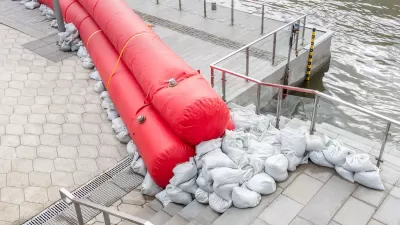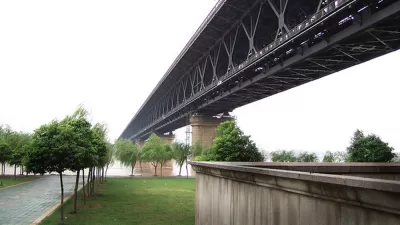Some Midwest cities' plans to upgrade decades-old sewer systems rely on outdated rainfall predictions as flood risks grow due to climate change and shifting weather patterns.

Experts warn that the wastewater system upgrades planned by some cities are 'already obsolete,' writes Diana Kruzman for Grist. "The designs are based on decades-old rainfall estimates that do not reflect current – let alone future – climate risk."
"As of 2004, more than 700 communities around the U.S. had combined sewer systems, where wastewater and stormwater flow through the same pipes." But the plans made by cities to modernize the systems won't hold up to future heavy rains. "In the decades since cities’ plans were first approved, storms in the Midwest have grown more frequent and intense. Total annual precipitation in the Great Lakes region has increased by 14 percent, according to research from scientists at the University of Michigan, and the amount of rainfall from the heaviest storms has grown by 35 percent."
The article details the city of Cleveland's Project Clean Lake, an initiative geared toward overhauling the city's water system that was launched in 1994 and continues to rely on 1990s data. "Despite these changes, [program manager for the Northeast Ohio Regional Sewer District Doug] Lopata said the sewer district isn’t planning to change the structure or design of Project Clean Lake, which aims to capture 98 percent of the water that would otherwise result in sewage overflows."
"Without significant federal aid, the costs of dealing with sewage-laced flooding are passed on to ratepayers, many of whom can’t afford to pay higher water bills in the first place. The price of water in cities like Cleveland and Chicago has more than doubled over the last decade, according to an investigation by APM Reports." Meanwhile, low-income communities face the biggest threats from outdated and unsafe infrastructure.
FULL STORY: Cities are investing billions in new sewage systems. They’re already obsolete.

Study: Maui’s Plan to Convert Vacation Rentals to Long-Term Housing Could Cause Nearly $1 Billion Economic Loss
The plan would reduce visitor accommodation by 25,% resulting in 1,900 jobs lost.

North Texas Transit Leaders Tout Benefits of TOD for Growing Region
At a summit focused on transit-oriented development, policymakers discussed how North Texas’ expanded light rail system can serve as a tool for economic growth.

Using Old Oil and Gas Wells for Green Energy Storage
Penn State researchers have found that repurposing abandoned oil and gas wells for geothermal-assisted compressed-air energy storage can boost efficiency, reduce environmental risks, and support clean energy and job transitions.

Santa Barbara Could Build Housing on County Land
County supervisors moved forward a proposal to build workforce housing on two county-owned parcels.

San Mateo Formally Opposes Freeway Project
The city council will send a letter to Caltrans urging the agency to reconsider a plan to expand the 101 through the city of San Mateo.

A Bronx Community Fights to Have its Voice Heard
After organizing and giving input for decades, the community around the Kingsbridge Armory might actually see it redeveloped — and they want to continue to have a say in how it goes.
Urban Design for Planners 1: Software Tools
This six-course series explores essential urban design concepts using open source software and equips planners with the tools they need to participate fully in the urban design process.
Planning for Universal Design
Learn the tools for implementing Universal Design in planning regulations.
Ascent Environmental
Borough of Carlisle
Institute for Housing and Urban Development Studies (IHS)
City of Grandview
Harvard GSD Executive Education
Toledo-Lucas County Plan Commissions
Salt Lake City
NYU Wagner Graduate School of Public Service





























